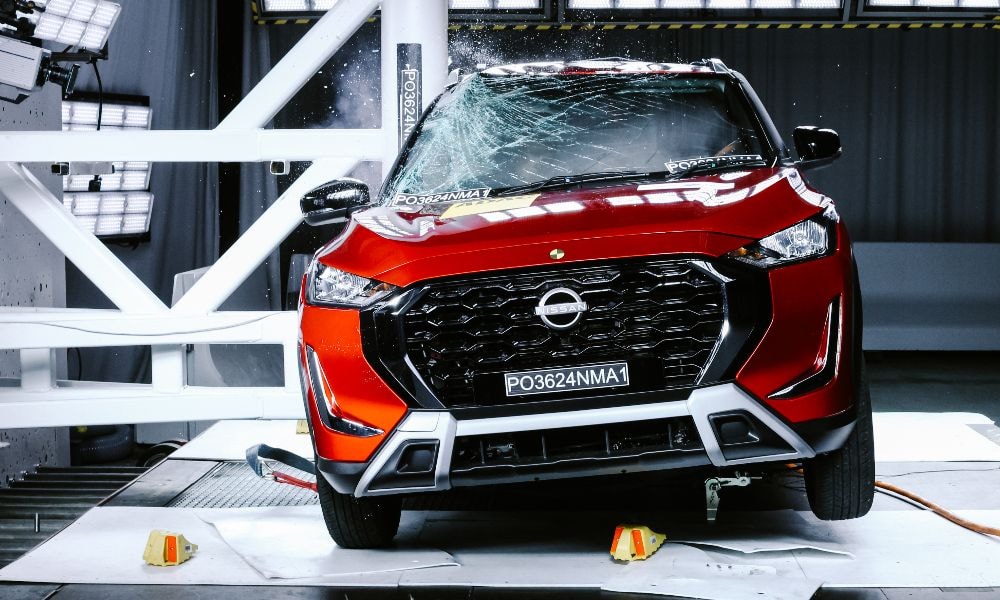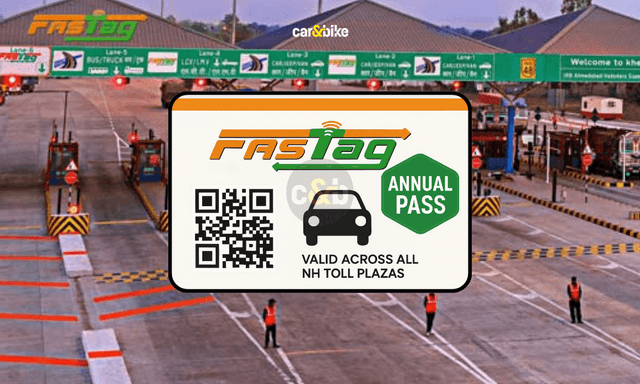Nissan Magnite Facelift Secures Five Stars In Second Round Of Global NCAP Crash Tests

- Nissan Magnite facelift awarded five stars for adult occupant protection.
- Magnite also secured three stars for child occupant protection.
- The SUV had initially been awarded a four-star rating by Global NCAP.
The Nissan Magnite facelift has joined the reasonably long list of cars and SUVs to be awarded a full five stars in the Global New Car Assessment Programme (GNCAP) crash tests. On July 24, Global NCAP published results of the facelifted Magnite's crash tests, revealing that Nissan had voluntarily submitted the SUV for fresh testing. It must be noted that the Magnite – equipped with two airbags – had previously received four stars from Global NCAP back in February 2022, but that was under the safety watchdog's old, and less stringent, testing protocol.
Also Read: Nissan Magnite Now Offered With CNG Kit For An Additional Rs 74,999
In 2025, Global NCAP re-tested the Magnite with two airbags, and gave it a two-star rating, with the car scoring 24.49 points out of 34 for adult occupant protection and 18.39 points out of 49 for child occupant protection. Nissan voluntarily submitted the Magnite facelift – equipped with six airbags as standard, along with electronic stability control (ESC) – and this unit secured a four-star rating for adult occupant protection as well as child occupant protection.
In a statement, Global NCAP said Nissan was ‘not satisfied’ with this result, and the Japanese carmaker chose to submit a ‘further improved’ Magnite, for a second voluntary test. It is this improved version that secured five stars for adult occupant protection, though surprisingly, it lost ground on child occupant protection, managing only a three-star rating. A query emailed to Nissan India inquiring about the nature of the improvement made to the Magnite remains unanswered at the time of publishing. We will update this story with the response from the company.
The re-tested, improved Magnite scored 32.31 points out of 34 for adult occupant protection, a considerable improvement on the 26.51 points racked up by the facelifted Magnite tested initially. While Nissan is yet to comment on what exactly was changed on the second test unit, a side-by-side look at the test results for both examples sheds some light on where the differences lie.
In the frontal offset deformable barrier test, the first Magnite tested (left) showed ‘weak’ protection for the driver's chest, and the report goes on to mention the driver’s and passenger’s knees showed ‘marginal’ protection as they could ‘impact dangerous structures behind the fascia’.
In the same test, the second, improved Magnite was deemed to offer ‘good' protection for the driver’s chest, as well as the front occupants' knees. It's worth noting that the body shell of the Magnite was rated stable and capable of withstanding further loadings in both instances. Both units were also deemed to offer good protection in the side impact as well as side pole impact tests.
The reports also make clear why the improved Magnite fared comparatively poorly for child occupant protection. The improved Magnite scored 33.64 points out of 49, compared to the first Magnite facelift's 36 points out of 49, with the former losing ground in the frontal impact test.
Global NCAP's analysis says the child seat for the 3-year-old test dummy – installed rearward facing using ISOFIX anchorages and a support leg – was ‘not able to prevent head contact with the interior of the car during the frontal impact’.
The child seat for the 18-month-old test dummy – installed rearward facing using the ISOFIX anchorages and a support leg – was able to prevent head exposure in the frontal impact test. The reason it lost points, as per Global NCAP, is because protection for the dummy's chest was deemed to be ‘slightly below’ what is considered ‘good’ under the test protocol.
Prices for the Nissan Magnite facelift range from Rs 6.14 lakh to Rs 11.76 lakh (all prices, ex-showroom).
Latest News
 Shams Raza Naqvi | Jan 26, 2026Renault Duster Makes A Grand Indian Comeback, Gets Hybrid TechThe nameplate which started the trend of compact SUVs in India has returned and almost everything is new but the name.3 mins read
Shams Raza Naqvi | Jan 26, 2026Renault Duster Makes A Grand Indian Comeback, Gets Hybrid TechThe nameplate which started the trend of compact SUVs in India has returned and almost everything is new but the name.3 mins read Jaiveer Mehra | Jan 26, 2026New Renault Duster India Debut Highlights: Specifications, Features, ImagesThe Duster nameplate is set to mark its return to India today after it was discontinued in 2022.2 mins read
Jaiveer Mehra | Jan 26, 2026New Renault Duster India Debut Highlights: Specifications, Features, ImagesThe Duster nameplate is set to mark its return to India today after it was discontinued in 2022.2 mins read car&bike Team | Jan 26, 2026India-EU Trade Deal: List Of Cars Likely To Get More Affordable In IndiaThe soon to be announced India-EU Trade Deal is likely to reduce import duties on cars made in Europe. We list down some popular names likely to get more affordable.2 mins read
car&bike Team | Jan 26, 2026India-EU Trade Deal: List Of Cars Likely To Get More Affordable In IndiaThe soon to be announced India-EU Trade Deal is likely to reduce import duties on cars made in Europe. We list down some popular names likely to get more affordable.2 mins read car&bike Team | Jan 26, 2026Import Duty On Cars Likely To Be Slashed To 40% Under India-EU FTA: ReportAs per a Reuters report, the reduced import duty could be applied to all vehicles priced over 15,000 euros (Rs 16 lakh approx).1 min read
car&bike Team | Jan 26, 2026Import Duty On Cars Likely To Be Slashed To 40% Under India-EU FTA: ReportAs per a Reuters report, the reduced import duty could be applied to all vehicles priced over 15,000 euros (Rs 16 lakh approx).1 min read car&bike Team | Jan 26, 2026New Renault Duster To Make India Debut Today: What To ExpectThe latest generation of one of Renault India's most successful nameplates will also be the French carmaker's first all-new product for India in five years.3 mins read
car&bike Team | Jan 26, 2026New Renault Duster To Make India Debut Today: What To ExpectThe latest generation of one of Renault India's most successful nameplates will also be the French carmaker's first all-new product for India in five years.3 mins read car&bike Team | Jan 26, 2026No Fastag Annual Pass For Three Row Cars? NHAI ClarifiesThe National Highway Authority of India (NHAI) has issued a clarification regarding usage of Fastag annual pass for 6/7 seater vehicles1 min read
car&bike Team | Jan 26, 2026No Fastag Annual Pass For Three Row Cars? NHAI ClarifiesThe National Highway Authority of India (NHAI) has issued a clarification regarding usage of Fastag annual pass for 6/7 seater vehicles1 min read
 Bilal Firfiray | Jan 21, 2026Tata Punch Facelift Review: New Turbo Engine; Same Old SoulWith the update, the Tata Punch facelift retains its character of being a healthy runabout, which is perfect for Indian roads. But have these changes made it any better?7 mins read
Bilal Firfiray | Jan 21, 2026Tata Punch Facelift Review: New Turbo Engine; Same Old SoulWith the update, the Tata Punch facelift retains its character of being a healthy runabout, which is perfect for Indian roads. But have these changes made it any better?7 mins read Amaan Ahmed | Jan 17, 2026Bajaj Chetak C25 First Ride Review: Basic, Likeable E-Scooter For First-Time RidersThe Chetak C25, in quite a few ways, is poles apart from the larger and more powerful 30 and 35 Series models, but in its mannerisms, it is very much a Chetak.8 mins read
Amaan Ahmed | Jan 17, 2026Bajaj Chetak C25 First Ride Review: Basic, Likeable E-Scooter For First-Time RidersThe Chetak C25, in quite a few ways, is poles apart from the larger and more powerful 30 and 35 Series models, but in its mannerisms, it is very much a Chetak.8 mins read Bilal Firfiray | Jan 9, 2026Toyota Urban Cruiser Hyryder: 10,000 km Long-Term ReviewAfter spending over three months and 10,000 km with the Toyota Urban Cruiser Hyryder Hybrid, we were impressed by its real-world mileage, seamless hybrid, practical comfort, and Toyota reliability. Is it the best C-SUV then?5 mins read
Bilal Firfiray | Jan 9, 2026Toyota Urban Cruiser Hyryder: 10,000 km Long-Term ReviewAfter spending over three months and 10,000 km with the Toyota Urban Cruiser Hyryder Hybrid, we were impressed by its real-world mileage, seamless hybrid, practical comfort, and Toyota reliability. Is it the best C-SUV then?5 mins read Seshan Vijayraghvan | Jan 8, 20262026 Mahindra XUV 7XO Review: Big On Tech, Bigger On ComfortThe new Mahindra XUV 7XO is flashier, feature packed, and comes with more advanced tech. But are the changes just incremental or actually substantial?1 min read
Seshan Vijayraghvan | Jan 8, 20262026 Mahindra XUV 7XO Review: Big On Tech, Bigger On ComfortThe new Mahindra XUV 7XO is flashier, feature packed, and comes with more advanced tech. But are the changes just incremental or actually substantial?1 min read Preetam Bora | Jan 10, 2026Simple One Gen 2 First Ride Review: 265 km Claimed Range!The Gen 2 model of Simple Energy’s first electric scooter gets a fair few updates, including new features, tech, more range and lighter weight. We spent a couple of hours with the Simple One Gen 2 to find out if it manages to impress.6 mins read
Preetam Bora | Jan 10, 2026Simple One Gen 2 First Ride Review: 265 km Claimed Range!The Gen 2 model of Simple Energy’s first electric scooter gets a fair few updates, including new features, tech, more range and lighter weight. We spent a couple of hours with the Simple One Gen 2 to find out if it manages to impress.6 mins read

























































































































